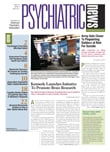Can having a bad job be more detrimental to mental health than no job? A study published in March in the Australian journal Occupational and Environmental Medicine says yes.
Peter Butterworth, Ph.D., an associate professor at the Centre for Mental Health Research at the Australian National University, and colleagues started from the long-established premise that employment is associated with myriad health (including mental health) benefits compared with unemployment. They said, however, that there has been "little direct comparison between the health effects of unemployment and [those] of jobs of varying psychosocial quality, especially longitudinally." They noted that "averse psychosocial work conditions such as high job demands, low decision latitude or control, job strain, a lack of social support at work, effort-reward imbalance, and job insecurity are well-established risk factors for poor health." The authors then sought to examine these characteristics in a longitudinal study of 7,155 working-age respondents to determine if poor-quality jobs continue to maintain a stronger association with mental health than unemployment does.
As hypothesized, researchers found that the relationship between labor-force status (employed, unemployed, and not participating in the labor force) and mental health was significant. Those employed have better mental health than the unemployed.
In discussing the study findings with Psychiatric News, Butterworth noted that "work provides a range of benefits over unemployment: not only access to financial and material resources, but also a sense of purpose and identity."
In an interview with Psychiatric News, Daven Morrison III, M.D., president of the Academy of Organizational and Occupational Psychiatry, echoed these thoughts, saying that work supports an individual's identity, and earnings tell the individual that he or she has value.
The longitudinal nature of the study enabled the authors to look at the link between employment circumstances and mental health over time and for individuals. This approach led to the finding that even when including a range of covariates—such as physical health, education, and experience of hardship—there was no difference in the mental health of unemployed individuals and individuals in the poorest quality jobs.
Butterworth told Psychiatric News, "Not all work is equal … . [The] findings show that the common assumption that any job offers mental health benefits for individuals over unemployment is not universally true."
The adverse mental effects of jobs with poor psychosocial conditions became starker when researchers looked at those going from unemployment into a new job. The results again confirmed that those moving from unemployment into a good job showed improved mental health. However, "those respondents who moved into poor-quality jobs showed a worsening in their mental health compared with those who remained unemployed."
This last finding raised some questions for Morrison. He was curious about the people who returned to work in a bad job. He would have liked the authors to ask whether the subjects previously had a better job and whether they were missing something from the previous job that the new position was unable to match, such as income, prestige, or security.
He noted that there is a lot of discussion in psychiatry about the difference between loss and grief and depression. He wondered whether respondents who returned to work in a bad job were mourning the loss of a better position as opposed to simply having difficulties with the new job.
While not the focus of this study, other questions about the mental health repercussions of a bad job revolve around the individual. Stephen Heidel, M.D., president of Heidel and Associates, told Psychiatric News that "individuals bring their own vulnerabilities to a situation." Some people are not a good fit for certain jobs. For example, perhaps someone with PTSD should not work in a convenience store where robberies have occurred.
The question remains, however, about what to do with what Heidel calls an "obvious truism." The authors contended that history has shown that the worst aspects of poor-quality jobs can be addressed through societal intervention and pressure and government policy. They pointed to previous regulatory changes geared toward ensuring worker safety and improving work conditions. Butterworth told Psychiatric News that the next step is to focus on the psychosocial aspects of employment.
"In the same way that we no longer accept workplaces that are physically unsafe or in which employees are exposed to dangerous substances, there could be a greater focus on ensuring a more positive psychosocial environment at work."
Heidel was skeptical that there is an easy fix. He doesn't believe that there is a magic number of criteria that can be modified to stop a job from having a negative impact on mental health. "Any one egregious element can make a job unbearable," and for a given individual, that element may be unknowable. Figuring out how to find and eliminate that one item for divergent individuals may not be a prescription for policymaking.
